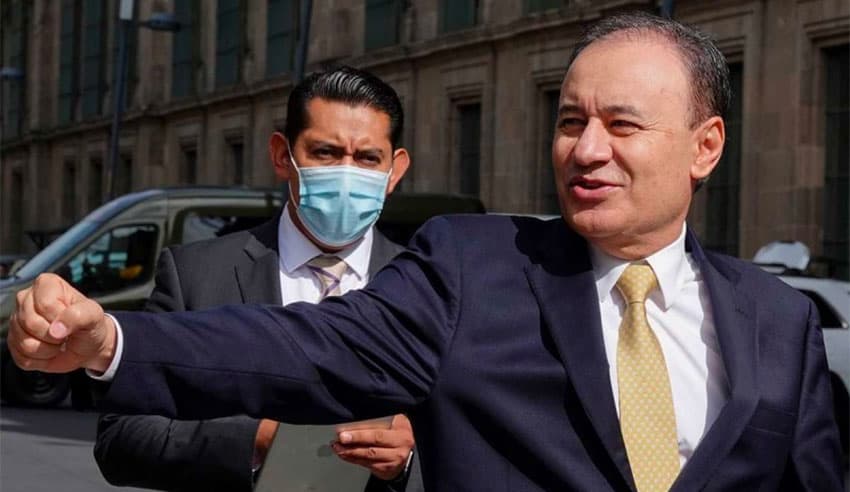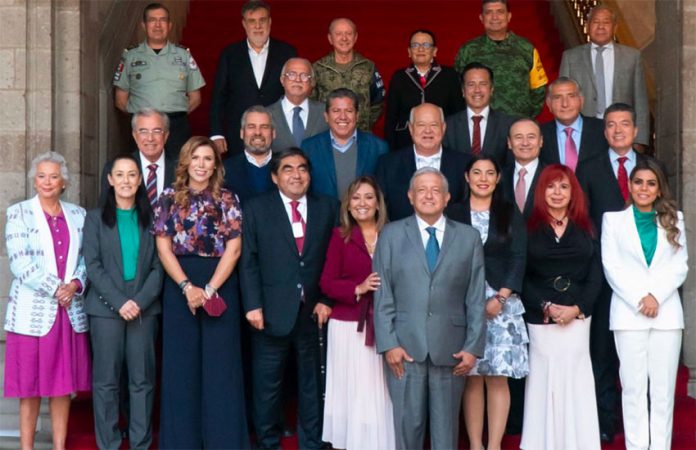The federal government will concentrate its anti-crime efforts on the 50 municipalities with the highest rates of insecurity.
That’s the message President López Obrador conveyed to ruling Morena party governors and governors-elect at a meeting on Wednesday at the National Palace in Mexico City.
The government has already made improving the security situation in 15 highly violent municipalities a priority, and has achieved some success.
Murder rates are down in nine of them – Tijuana, Ciudad Juárez, Celaya, Culiacán, Benito Juárez (Cancún), San Pedro Tlaquepaque, Irapuato, Iztapalapa and Salamanca, but up in six – León, Cajeme (Ciudad Obregón), Acapulco, Guadalajara, Chihuahua and Morelia, according to recent government data.
Alfonso Durazo, governor-elect of Sonora and the federal government’s security minister between 2018 and 2020, told reporters outside the National Palace that “the need to strengthen some actions to improve the fight against insecurity” was one of the main topics of discussion at the meeting with the president.
“Concentrating efforts in the 50 municipalities that today have the most serious [crime] statistics, particularly in intentional homicides, was spoken about,” he said.
According to crime monitoring website elcri.men, the 50 municipalities with the highest per-capita homicide rates in the 12 months between June 1, 2020 and May 31, 2021 are located in 12 states: Baja California, Sonora, Michoacán, Quintana Roo, Zacatecas, Guanajuato, Chihuahua, Morelos, Guerrero, Colima, Tamaulipas and Jalisco.
Tecate, Baja California – considered Jalisco New Generation Cartel (CJNG) country – has the highest per-capita rate with 189.9 homicides per 100,000 people followed by Caborca, Sonora; Zamora, Michoacán; Tulum, Quintana Roo; Fresnillo, Zacatecas; Cotija, Michoacán; Jacona, Michoacán; Apaseo el Alto, Guanajuato; Valparaíso, Zacatecas; and Apaseo el Grande, Guanajuato.
Durazo said the president and the Morena governors and governors-elect agreed to join forces in the fight against crime and work together on other issues to “provide the best results.” Once the governors-elect take office later this year, Morena will govern exactly half of the country’s 32 states.
Durazo, who was security minister during the two worst years on record for homicides in Mexico (2019 and 2020), said the federal government’s security strategy – the so-called hugs, not bullets approach – will not change as authorities attempt to combat crime in the country’s most violent municipalities. The focus on addressing the root causes of violence – things such as poverty and lack of opportunity – will not change, he said.
López Obrador has publicly maintained confidence that the government’s social and welfare programs will succeed in lowering violence but homicides remain at near record levels, although federal officials have celebrated a 2.9% decline in the first five months of this year.

Durazo said that while the country waits for the security strategy to “bear fruit,” authorities “have to act in other areas.”
He cited strengthening the National Guard, combatting corruption and improving police training as examples.
Probed as to whether additional National Guard troops would be deployed to the 50 municipalities with the worst security situations, the incoming governor told reporters that the discussions didn’t “reach that level of detail.”
“But obviously … the actions could imply a greater use of force, it will depend on the recruitment process that the National Guard is carrying out,” Durazo added.
Others said that López Obrador urged them to personally attend to security issues and participate in the federal government’s early-morning “peace building” meetings.
“[The agreement] is that we’re going to work on an issue that interests and plagues all of us,” said Rubén Rocha, governor-elect of Sinaloa, home state of the Sinaloa Cartel, one of Mexico’s most powerful criminal organizations.
“On security matters, we’re going to work in coordination, that’s the fundamental agreement.”
Indira Vizcaíno, governor elect of Colima, said that federal and state security statistics were reviewed during a lengthy meeting at the National Palace. Two municipalities in the small Pacific coast state, Manzanillo and Armería, are among the 50 most violent municipalities, according to the data compiled by elcri.men.
“Naturally we were speaking about what [security] strategy will have to be implemented,” Vizcaíno said before acknowledging that Colima is one of the most violent states in the country on a per capita basis. Homicide, femicide and kidnapping rates are all high in the state, she said.
“So without a doubt working together [with the federal government] in a coordinated way is essential for us,” Vizcaíno said.
Of the 50 most violent municipalities, 26 are located in states that are already governed by Morena or will be by the end of the year.
Guanajuato, Mexico’s most violent state, has the highest number of municipalities on the list with 11. The Bajío region state, where the CJNG, the Santa Rosa de Lima Cartel and numerous smaller criminal groups are vying for control, is currently governed by the National Action Party. López Obrador has described the security situation in the state as “complicated.”
With reports from Reforma
